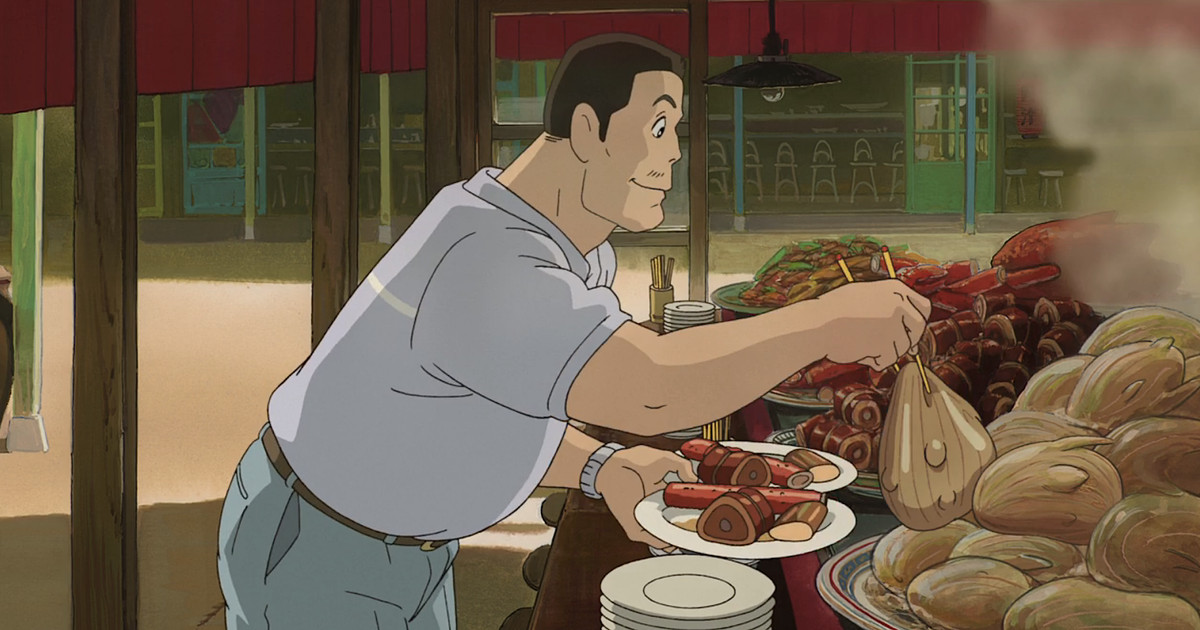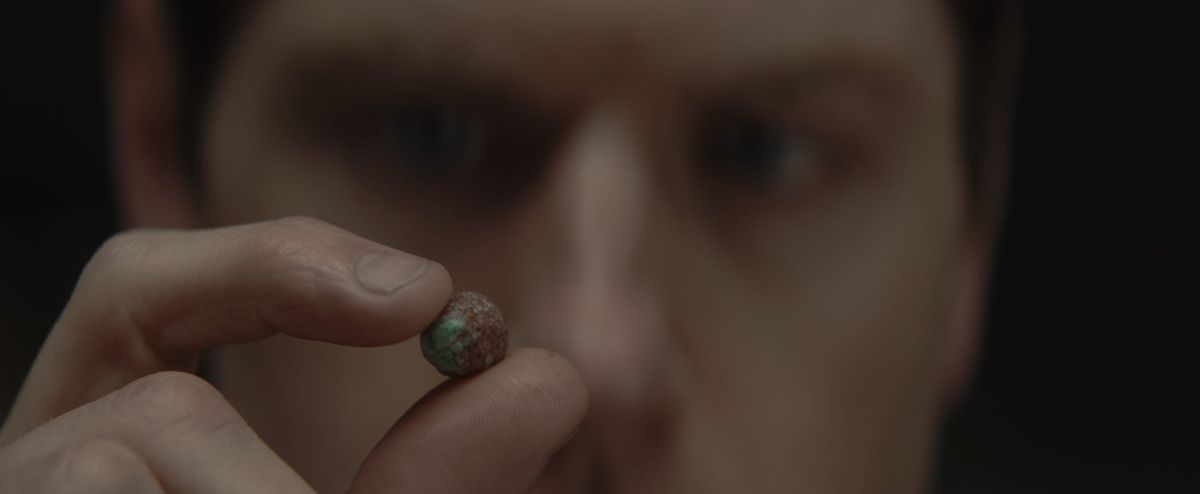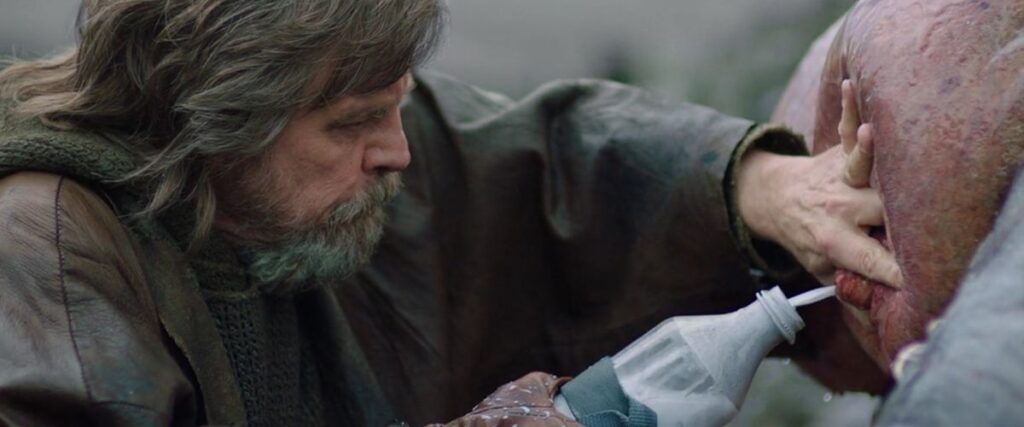Quick: What’s the first thing that comes to mind when you hear “Star Wars food?” It’s a safe bet that most people either think of blue or green milk, or the roasted Porg from The Last Jedi. That’s odd, given that the franchise has so much room for sumptuous feasts: It now amounts to nine mainline movies, two stand-alone live-action films, an animated film, four recent live-action TV series, and nearly two decades of canon animated shows. And yet practically no one in all those hours of Star Wars run time really gets much time to enjoy a meal. But there’s always a chance that could change with Lucasfilm’s teased collaboration with Japan’s Studio Ghibli.
For a franchise with such an expansive setting, Star Wars is sparse on actual craveable food. The menu in Disney theme parks’ Star Wars land, Galaxy’s Edge, contains a lot of proper nouns and food coloring, but very little of it actually screams Star Wars, except for Blue Bantha, which again is just blue milk. The same goes for the recipe page on StarWars.com; it’s heavy on arts-and-crafts-style concoctions that look like Star Wars characters, which is a far cry from A Feast of Ice and Fire: The Official Game of Thrones Companion Cookbook. I can tell you Sansa Stark’s favorite dessert is lemon cakes. I have no idea whether Luke Skywalker actually likes green milk — his expression when he’s drinking it in Last Jedi, and the bit he leaves dribbling from his mouth, says he probably doesn’t.
Image: Lucasfilm/Disney
That makes the prospect of Studio Ghibli tackling a Star Wars story seem like a perfect opportunity to let Star Wars characters actually enjoy food. Most Ghibli fans can absolutely name several iconic food-centric scenes in Ghibli films: the glistening food stands in Spirited Away, the elaborate breakfast in Howl’s Moving Castle, the tempting ramen in Ponyo.
A key distinction here is that food doesn’t just sit around in the background in a Studio Ghibli film. It’s a centerpiece; it’s something for companions to enjoy and revel in together. In Howl’s Moving Castle, Sophie takes charge of her new role and connects with her found family by cooking for and with them. In Ponyo, the little fish-girl of the title discovers something amazing about the human world when she first tries its food.
Even when food is deployed as a trap, like in Spirited Away, it’s depicted with loving detail meant to ensure that the audience falls for that trap too. Characters want to enjoy food in Studio Ghibli films, and watching those scenes, it’s easy to empathize. Food is part of the human experience, and by lovingly depicting the fat and oil and running juices, Studio Ghibli drags the audience into its characters’ viewpoints — and their rumbling stomachs.

Image: Studio Ghibli
Food does appear throughout Star Wars franchise installments. There’s a plethora of fruit on display throughout the setting: Shmi’s fruit bowl in The Phantom Menace, levitating pears as Anakin and Padme flirt on Naboo in Attack of the Clones, breakfast at the Karn household in Andor. Darth Vader has a nice arrangement of refreshments laid out for Han Solo and Leia in The Empire Strikes Back. But none of it is shot like it’s meant to be craveable.
The few times we do see people savor food in Star Wars, it’s often a joke at someone’s expense. Like Jabba the Hutt eating the whimpering frog-creature in Return of the Jedi, or Grogu scarfing down precious unfertilized frog-person eggs in The Mandalorian. The most craveable food scene of all of Star Wars (for meat-eaters, at least) is Chewbacca roasting a Porg (which looks like a perfect rotisserie Cornish hen), then getting guilted into setting it down by the horrified stares of the surrounding Porgs.
In Andor, Star Wars’ latest and most grounded installment, no one enjoys eating. Meals at Mon Mothma’s house are tense affairs where family members are more interested in passive-aggressively sniping at each other than in finishing their meal. Syril Karn, the wannabe fascist and absolute failson, glowers at his cereal puffs in blue milk while trying to avoid the worst of his mother’s jabs, and we see no sign of the home-cooked meals his mother supposedly prepares.

Image: Lucasfilm/Disney
The markets in Star Wars, seen in The Phantom Menace, The Mandalorian, and Obi-Wan Kenobi, are full of grilled street food that none of our characters have time or desire to eat. Obi-Wan in his titular show cuts little slices of alien sashimi out in the desert air day after day, but it’s depicted as an assembly line of grimly faced people slaving away for little pay. Food is everywhere. But who in this galaxy far, far away actually wants it?
I do. I want it. I want Star Wars to be full of oil-slicked meats and slightly charred vegetables. I want to see tart-looking juice spurting out of alien fruits as people bite into them with gusto. I want to see hungry characters sit down and share a lovingly made meal. Star Wars doesn’t need ASMR food scenes, but for a franchise that’s currently so focused on dialing its traditional action down to a more human scale and more relatable stories, never showing characters indulging in one of life’s greatest joys feels like a missed opportunity. If Studio Ghibli lets Star Wars characters just enjoy some food for once, it has the chance to make Star Wars feel a little more real, and a little more human.

